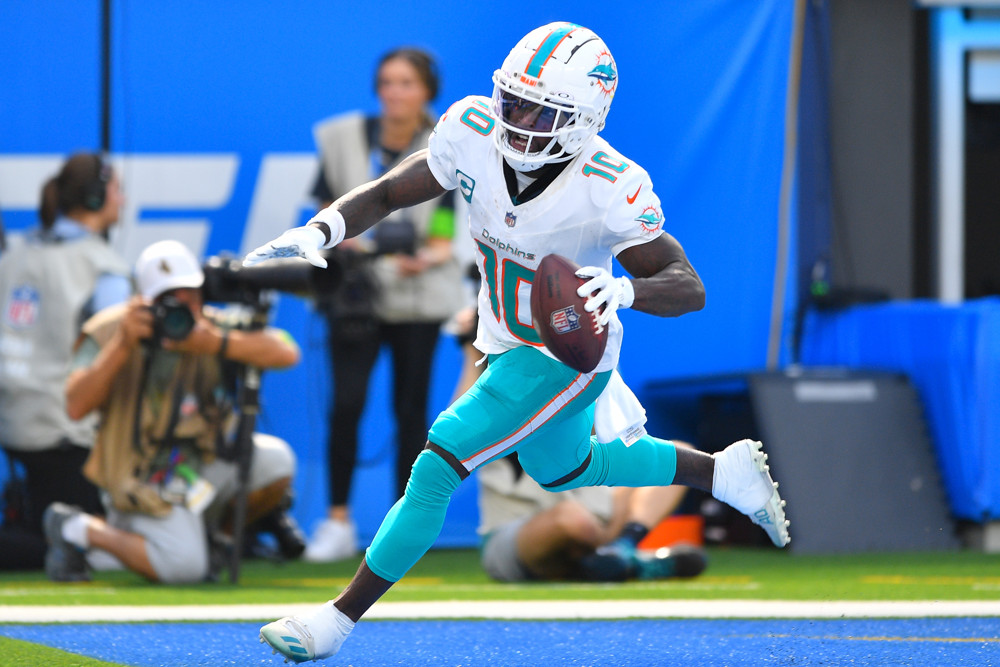Cautionary Tales for the Miami Dolphins
9 min read
Dolphins WR Tyreek Hill
The NFL is still reeling from the Miami Dolphins putting up 70 points on the Denver Broncos. Seventy! While they didn’t quite break the all-time scoring record – and they could have at least tied it, had they not decided to show mercy and kneel out the fourth quarter – they did set several other records. They scored the most offensive points in a game in NFL history, as all of the other 70-point games included defensive or special teams touchdowns. Not Miami – five rushes, five passes, clean and crisp and simple. They arguably set a record for most total yards in a game, depending on how you count 1950s-era statistics. Their 130 points through three games is the highest for any team since the 1970 merger, beating out Peyton Manning and the 2013 Broncos. And they have the highest offensive VOA ever recorded through three games at 61.4%, nearly 10% higher than any other offense since at least 1981.
In the direct aftermath of that game, it feels like the Dolphins are inevitable – that, when they’re firing on all cylinders, they can’t be stopped. This ignores the fact that they won their first two games by a combined nine points, and that they’re actually three-point underdogs to the Buffalo Bills this week. While it’s hard to imagine an offense as potent as this one sitting home in January, even extreme success in the first three weeks of the season doesn’t necessarily guarantee a team a playoff berth. A win just counts as one win, whether you win by one point or by 50.
Let’s provide a cautionary tale for Tyreek Hill, Mike McDaniel and the rest of the Dolphins to read while resting their hamstrings, which surely must be sore as heck after marching up and down the field in the Miami heat. While they’re in uncharted waters when it comes to early season offense, some of the teams in their general vicinity have petered out after a hot start. Three of the top 20 teams in scoring since the merger turned their hot start into a season of disappointments. Here’s what happened, and what Miami might be able to learn.
3. 2011 Buffalo Bills
How Did it Start?
After missing the playoffs for the previous 11 years in a row, the 2011 Bills looked primed to finally right the ship behind a little Fitzmagic. Ryan Fitzpatrick threw four touchdowns on opening day in a 41-7 romp over the Kansas City Chiefs, and then three more in a wild back-and-forth 38-35 win over the Raiders in Week 2. That set up a match against the Patriots, who had won 15 straight games against Buffalo. Not this year! Although New England jumped out to a 21-0 lead, Tom Brady ended up throwing four interceptions including a fourth-quarter pick-six. Rian Lindell kicked a chip shot field goal as time expired to give Buffalo a 34-31 victory. “It’s the biggest win of my career”, Bills linebacker Chris Kelsay said about the Week 3 victory. That’s kind of sad, but what’s not sad was scoring 113 points in three games. The playoff drought will soon be over!
What Happened?
The playoff drought was not soon over! The Bills didn’t collapse right away; they hovered around .500 for a few weeks which left them at a solid 5-2 entering Week 9. In that last win, though, Fitzpatrick cracked some ribs and was playing through pain for most of the rest of the season. It perhaps isn’t coincidence, then, that the Bills started a seven-game losing streak the week after, on their way to bottoming out at 6-10.
In those first seven games, the Bills took care of the ball and took care of business, with a +9 turnover differential. That fell to -9 the rest of the way, partially because Fitzpatrick started throwing picks left, right and center – he would finish with 23 on the year. But it wasn’t just him, mind you – Shawne Merriman, Eric Wood, Terrence McGee, Kyle Williams and Fred Jackson all finished the season on injured reserve as the roster just started shedding healthy parts left and right down the stretch. The playoff drought would continue for six more seasons, before Sean McDermott’s team broke it in 2017.
What Can Miami Learn?
Health is really important. While it’s a little unfair to blame all of Buffalo’s problems on their progressively more and more injured squad, it’s far, far easier to succeed when you have all your key pieces healthy and ready to go. Miami survived the loss of Jaylen Waddle for the Denver game – RIP Waddle’s on/off splits – but an injury to Tyreek Hill or yet another one for Tua Tagovailoa might be a different story.
2. 2008 Denver Broncos
How Did it Start?
Mike Shanahan’s final season as Broncos coach started off with fireworks. Jay Cutler began his one and only Pro Bowl season with plenty of offensive fireworks – Eddie Royal, filling in for a suspended Brandon Marshall, had nine receptions for 146 yards in a 41-14 rout over the Oakland Raiders. That was followed by back-to-back shootouts. First, Denver beat San Diego 39-38 in the game where referee Ed Hochuli infamously inadvertently whistled a Cutler fumble dead before Tom Dobbins scooped it up. Then, Denver held on for dear life and withstood a late Drew Brees comeback to hold off New Orleans 34-32. That’s 114 points in three games, which is more than enough to beat most teams. Now, if the defense could only start doing its part and slow a couple teams down, Denver could have a nice, comfortable season.
What Happened?
Denver’s defense did not start doing its part. They finished the year dead last in defensive DVOA at 21.5%, unable to tackle much of anyone as opponents marched up and down the field against them. They only held four teams below 20 points all season long, meaning the offense had to be at the top of its game week in and week out for them to stand a chance. They managed to walk that tightrope going into December, sitting at 8-5 with three weeks to go. To make things better, they had a three-game lead over the 5-8 Chargers, meaning they’d have to lose three straight and have San Diego win three straight for them to miss out on the playoffs. That had to be nearly impossible!
Week 15: the Panthers dominate the Broncos 30-10 as the dual-threat of DeAngelo Williams and Johnathan Taylor rushed for a combined 140 yards and two touchdowns. Week 16: Denver jumps out to a 13-0 lead over Buffalo, but the Bills scored on five straight possessions in an eventual 30-23 victory. With the Chargers taking care of business at home, that set up a winner-take-all game in Week 17 for the division title – and Denver got absolutely spanked. San Diego got revenge for Hochuli’s blunder, with LaDainian Tomlinson scoring three times and Philip Rivers throwing for pair of touchdowns himself in a 52-21 drubbing, making Denver the first team to ever hold a three-game division lead with three games to go and still miss the postseason. Denver, physically destroyed and demoralized, ended up firing Shanahan and entering the Josh McDaniels era. I’m sure that ended up going totally fine for them.
What Can Miami Learn?
Offense, by itself, isn’t everything, because you can’t shootout your way to victory every week. Miami ranks just 21st in points allowed at 71; they let in 34 points against the Chargers and just barely hung on to victory there. You can’t expect to put up 30 points a week every week. Vic Fangio is a great defensive coordinator, but it has historically taken a year or two for his impact to really be felt on a defense. Miami is not going to turn into a defensive powerhouse overnight or anything, but if they can hold a few teams under 300 yards of offense and not feel like they have to put up 35 points to win a game, their path to the postseason will be much easier.
1. 2002 New England Patriots
How Did it Start?
The defending Super Bowl champion Patriots looked to defend their title in style, trading away Drew Bledsoe and opening up Gillette Stadium to officially lock in some kid named Tom Brady as their permanent starter. Things could hardly have started any better, either. They rocked the Steelers 30-14 on Monday Night Football to start the year, then headed into Giants Stadium and flat-out embarrassed the Jets, 44-7. Things got a little hairier the next week against the Chiefs, with Priest Holmes running for 180 yards and a pair of scores against them late, but New England held on for a 41-38 victory. Yes, the Patriots had scored 115 points in three games, and were ready to show the world that they were no one-hit wonder fluke.
What Happened?
New England would only top 30 points or 300 yards of offense twice more that season. As the weather got colder, the explosiveness promised by the likes of David Patton, Troy Brown and Antowain Smith never really ended up materializing again. Part of the problem was an inability to stop the run. Holmes’ 180 yards on the ground were just the beginning, as LaDainian Tomlinson, Ricky Williams (twice!), Ahman Green, Clinton Portis, Eddie George and Curtis Martin all topped 100 yards on the ground against the Patriots. Their 2.6% run defense DVOA was the lowest of the dynasty seasons, meaning that other teams could keep the ball, control the flow of the game, and generally not let Bill Belichick and the Pats shut them down entirely.
After the 3-0 start, the Patriots rattled off four straight losses, the longest losing streak in Tom Brady’s career. The Patriots did right the ship some down the stretch, but two awful offensive performances against the Titans and Jets in December, with New England failing to put up even 120 passing yards, left the Patriots needing to win and get help in Week 17 to make the playoffs. Brady had a little magic in him, rallying from a 21-7 deficit to knock off the Dolphins on an Adam Vinatieri field goal in overtime…but the Jets also took care of business that afternoon against the Packers, leaving both teams at 9-7. That meant the Patriots lost the division title on the common games tiebreaker to New York, and lost the final wildcard berth to Cleveland on the conference record tiebreaker. It remains the only season where Brady started a majority of his team’s games and missed the postseason.
What Can Miami Learn?
Generally speaking, scoring can go down over the course of the season even for good teams, as injuries, fatigue and weather all become factors. The Dolphins, however, don’t have to worry about that quite so much, with five of their final six games at home. The harsh winter weather of Miami is unlikely to meaningfully slow Miami down. But, in an offense built so much on speed, not having to play in a mudpit or a snowstorm seems more important than to the average team, so perhaps the lesson to be learned here is not about making the playoffs, but about earning that top seed and making sure the route to the Super Bowl comes to Florida. You like their odds much better there than if they have to travel to Buffalo come January.
Fortunately for them, they are now the only team in the AFC to control their own destiny for the bye week – 14-0 from here on out guarantees it no matter what happens, though 11-3 is probably the break even point where they’re more likely than not to earn that week off.
